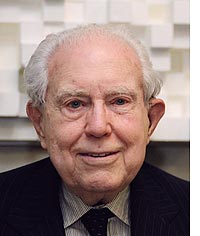Carter interview on Soundings and Three Illusions

Elliott Carter discusses his two new orchestral works, both being premiered on 6 October: Soundings in Chicago and Three Illusions in Boston
Your new work Soundings employs Daniel Barenboim both as conductor and pianist. How do you achieve this in the score?
The work opens and closes with passages featuring Mr Barenboim as pianist, but between that he is pretty busy conducting the orchestral musicians. His opening has a series of majestic keyboard chords resonating, and that harmonic material forms the basis of what the orchestral groups then play.
How have you personalised the music as a tribute to him?
He has been a great champion of my music, and I wanted to make the work as personal as possible – so I’ve built his initials into the piano part, D for Daniel and Bb for Barenboim. Towards the end of the work he picks out these notes again on the keyboard and then stops the orchestra abruptly with a Bb, as if calling for silence before his last short solo.
This is a good example of the work’s humorous tone. Are there others?
The humour comes over mainly through the instrumentation. There’s a woodwind quartet that jumps around all over the place, a trio of piccolos in fast counterpoint with funny interjections from the xylophone, and a rambunctious tuba solo with very little accompaniment, which I guess could sound comical in an orchestral piece. I wanted the overall mood to be light-hearted.
Turning to Three Illusions, how did you make your literary selection for the movements?
I was asked to write a short orchestral concert-opener by James Levine and started looking in a dictionary for synonyms for the word ‘fantasy’. The word Micomicón came up, and after a bit of research I found out it was an imaginary kingdom in Cervantes’s Don Quixote, and that set me going.
After the premiere of Micomicón I was asked to add some more music and I wanted the next piece to provide a contrast. I was thinking of something that was faster and more brilliant, with big arpeggio flourishes, and rapid entries and exits for the orchestral groups. Watery imagery kept coming into my mind, and I read in some old French literature about Jupiter falling in love with Youth and turning her into a fountain which could make old people young again - the Fons Juventatis.
The third movement is titled Utopia, after Thomas More’s book. The Greek ou-topos means ‘no-place’, and More described a supposedly happy society without a central government and with no private ownership. Yet it seems to me that freedom has been sacrificed because everyone is so hemmed in by rules to create that almost communistic form of equilibrium. This seemed to parallel my ideas for a contained music in which nothing appeared to change, built from a series of slow-changing chords, but where the harmonies shift almost as if individual will can’t be suppressed. The work ends abruptly – a reference to Thomas More’s beheading.
When you look at the programmes surveying your works at the Musica festival in Strasbourg and the BBC Symphony weekend in London, do you see patterns emerging across your output?
Sometimes your musical course is guided by circumstances. For instance when I was young I only moved in avant-garde circles, led by my friendships with Varèse and Ives, and I didn’t have any interest in classical music like Beethoven. But when I went to Harvard and tried to write in a modern style they thought I was a crazy man. So that was why I studied with Nadia Boulanger and became engaged on my return to the States with a simpler style, closer to neo-classicism. Gradually I began to try to incorporate new techniques in works like the Piano Sonata, but I really had to make a complete break to find out how to write the music I had heard when I was young.
So my String Quartet No.1 was really a return to the music I had first loved, and that paved the way for works like the Piano Concerto and Double Concerto. I don’t think my music has really changed since then, though some folks think my recent music is somehow ‘easier’. Perhaps as I’ve got older I’ve got more used to my musical vocabulary and no longer need to plan everything out. And gradually, since the Oboe Concerto, I’ve enjoyed having a freedom to experiment with some new things, like introducing thinner textures and silences.
Interviewed by David Allenby
Photo: © Jeff Herman
